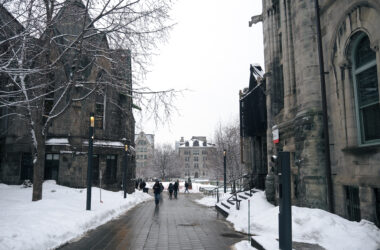 Matt Essert
Matt EssertTwo weeks ago, Deputy Provost (Student Life and Learning) Morton Mendelson presented to the University Senate the findings of the Diversity Survey conducted over the past year and a half that was designed to find out more about the composition of McGill’s student body.
The survey, to which more than 2,000 students responded, reported, among other things, that McGill students are more likely to have at least one parent who attended university and that students’ parents are more likely to pay their tuition than at other Canadian universities. The survey also broke down the students’ religious beliefs (39 per cent Christian, 8 per cent Jewish, 4 per cent Muslim, and 41 per cent non-religious) and the levels of discrimination faced by different groups of students. The Tribune recently sat down with Mendelson to discuss the report’s finding and the administration’s response.
Which parts of the survey’s findings surprised you most?
I can’t say I was surprised, but I was a little concerned by the responses regarding discrimination, and that there was reason to conclude that McGill is not as welcoming as it might be to all of our students. That was a bit of a concern. Those results weren’t a surprise but they were something of a disappointment.
Here’s one thing that was a bit of surprise: In some areas, there really was a lack of awareness of services offered at McGill, both by McGill’s Student Services and by student associations. We’ve shared the information, but we’re going to be analyzing the data further so that [Student Services] can better reach groups of students who may not be aware of the services that they offer.
In your remarks to the Students’ Society Council, you noted that, on the basis of national origin, the group that reported the most discrimination was Americans. Can you elaborate?
The group that had the highest level of perceived discrimination was American students. Whenever I present this to anyone at McGill, it seems that people smile. And I think they smile because they say, “Oh, well, Canadians are critical of Americans and so . . .” But the smiling is an indication of the problem, because we wouldn’t smile at discrimination against other groups, I hope.
We also asked about sexual orientation, and not surprisingly, students who self-identify as homosexual and bisexual perceive experiencing a lot more discrimination than other groups.
How is the administration planning to remedy this?
I’m happy to answer that question, but we should also ask, “What can we all do?” There were two aspects of discrimination reported by the survey: discrimination by McGill employees and discrimination by fellow students. Students were, not surprisingly, experiencing more discrimination by students, in most categories, than by employees, presumably because they spend more time with students and because there are just far more students around.
What we’re hoping to do is, in the first instance, follow up on the survey to better understand what it is that students are experiencing. This survey, as a whole, was to get a broad-stroke picture of the diversity of our students, or lack thereof in some cases. It wasn’t designed as a survey on discrimination. There are a lot of different aspects of discrimination that we really need to follow up on. We also need to have some general consciousness-raising in the university, for employees and for students. I think we need to have a “Be Respectful” campaign of some sort, which would be a terrific project for the university and students to partner on.
The survey also found that McGill students, on the whole, are significantly more economically privileged than students at the average Canadian university. How will McGill move forward on this?
We’ve been working on that. A number of years ago, we introduced an entrance bursary so that students can know about the financial aid that they will receive before they actually have to make a decision about whether or not they would accept an offer of admission. The Principal’s Task Force on Diversity, Excellence, and Community Engagement has a number of suggestions on increasing pipelines of students from underrepresented groups, including groups with low socioeconomic backgrounds. That’s another area where we have to do some work. We’re focusing on two primary areas: increasing financial aid and supporting students from more diverse backgrounds. It’s not enough to provide money for someone to attend university; students who are the first in their families to attend universities are in a somewhat foreign territory, and they can’t rely on family support in the way that people whose parents have been to university can. There are certain kinds of support we need to provide to ensure that people who come here from underrepresented groups are made to feel welcome and can succeed.
— Compiled by Theo Meyer. Interview has been edited and condensed.









